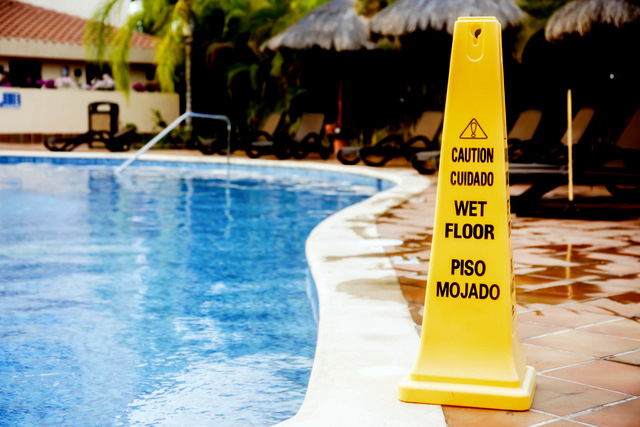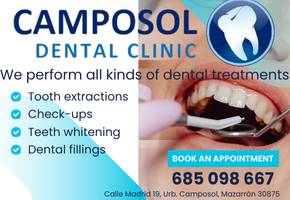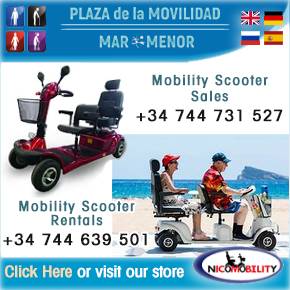- Region
- Águilas
- Alhama de Murcia
- Jumilla
- Lorca
- Los Alcázares
- Mazarrón
- San Javier
-
ALL AREAS & TOWNS
- AREAS
- SOUTH WEST
- MAR MENOR
- MURCIA CITY & CENTRAL
- NORTH & NORTH WEST
- TOWNS
- Abanilla
- Abarán
- Aguilas
- Alamillo
- Alcantarilla
- Aledo
- Alhama de Murcia
- Archena
- Balsicas
- Blanca
- Bolnuevo
- Bullas
- Cañadas del Romero
- Cabo de Palos
- Calasparra
- Camping Bolnuevo
- Campo De Ricote
- Camposol
- Canada De La Lena
- Caravaca de la Cruz
- Cartagena
- Cehegin
- Ceuti
- Cieza
- Condado de Alhama
- Corvera
- Costa Cálida
- Cuevas De Almanzora
- Cuevas de Reyllo
- El Carmoli
- El Mojon
- El Molino (Puerto Lumbreras)
- El Pareton / Cantareros
- El Raso
- El Valle Golf Resort
- Fortuna
- Fuente Alamo
- Hacienda del Alamo Golf Resort
- Hacienda Riquelme Golf Resort
- Isla Plana
- Islas Menores & Mar de Cristal
- Jumilla
- La Azohia
- La Charca
- La Manga Club
- La Manga del Mar Menor
- La Pinilla
- La Puebla
- La Torre
- La Torre Golf Resort
- La Unión
- Las Palas
- Las Ramblas
- Las Ramblas Golf
- Las Torres de Cotillas
- Leiva
- Librilla
- Lo Pagan
- Lo Santiago
- Lorca
- Lorquí
- Los Alcázares
- Los Balcones
- Los Belones
- Los Canovas
- Los Nietos
- Los Perez (Tallante)
- Los Urrutias
- Los Ventorrillos
- Mar De Cristal
- Mar Menor
- Mar Menor Golf Resort
- Mazarrón
- Mazarrón Country Club
- Molina de Segura
- Moratalla
- Mula
- Murcia City
- Murcia Property
- Pareton
- Peraleja Golf Resort
- Perin
- Pilar de la Horadada
- Pinar de Campoverde
- Pinoso
- Playa Honda
- Playa Honda / Playa Paraíso
- Pliego
- Portmán
- Pozo Estrecho
- Puerto de Mazarrón
- Puerto Lumbreras
- Puntas De Calnegre
- Region of Murcia
- Ricote
- Roda Golf Resort
- Roldan
- Roldan and Lo Ferro
- San Javier
- San Pedro del Pinatar
- Santiago de la Ribera
- Sierra Espuña
- Sucina
- Tallante
- Terrazas de la Torre Golf Resort
- Torre Pacheco
- Totana
- What's On Weekly Bulletin
- Yecla


- EDITIONS:
 Spanish News Today
Spanish News Today
 Alicante Today
Alicante Today
 Andalucia Today
Andalucia Today
Basic Spanish pool and summer swimming safety advice
Accidents around the pool cause more deaths than accidents in them
Leaping into the cooling waters of a swimming pool or wading out into the sea is a natural response to the increased summer temperatures in Spain, but sadly for the emergency services, signals a busy time of year  for them as domestic accidents and fatalities increase.
for them as domestic accidents and fatalities increase.
Whilst swimming pools represent welcome relief from the heat, they are also extremely dangerous and it is estimated that over 650 accidents take place every day across the European Union, with many people dying in their own pools every year.
Each year the Ministry of Health issues safety advice to bear in mind when using private swimming pools and urges users to bear safety in mind, particularly when children and more elderly visitors are visiting.
A few tips from the Ministry and long-term Spanish residents:
Holiday users and youngsters.
Pools are a big danger for toddlers and young children who have not yet learnt to swim, as well as for those who can.

Remember, a toddler can drown in a few shallow inches of water in a blow-up pool or Jacuzzi as well as a swimming pool.
Well all spend thousands on a swimming pool, yet few with young grandchildren would think about installing safety features to keep their grandchildren out of the pool, rather than in it. But each year holidays are destroyed by tragic deaths as young children fall into swimming pools and drown.
Shallow water.
Death through what is known as "lesions" is high in teenagers: 95% of teenage deaths are due to young people diving and jumping into shallow areas of domestic pools, knocking themselves out on the bottom and drowning. Anyone with a sloping pool is urged to ensure that shallow points are clearly marked to avoid these types of accidents. There are also high numbers of accidents caused by young teenagers slipping, running 
Deaths have also been recorded when an individual trips over alongside the pool, or slips, knocks themselves out, then rolls into the pool and drowns.
Elderly deaths
Most of the accidents involving the more mature are caused by accidents around the pool, rather than in it. Slipping, tripping, falling around the edge of the pool, then falling into the water are the main problems, rather than accidents in the water, so the advice given is again to ensure non-slip surfaces are used, and not leave any obstacles around the pool which could be tripped over, including plant pots, toys, hosepipes, etc which could be dangerous.
If you have slippery tiles, consider installing non-slip matting over the top, but make sure it’s properly fastened down, with no uneven edges to trip up the unwary.
Its also advisable to splash water over the body before entering the water to lower the body temperature gradually as this shocks the system less. Never immerse a more mature person in cold water either if youre trying to cool them down, always make sure the water is warm to avoid shock.
Minor accidents around the pool
Consider all aspects of safety when moving around a pool and positioning seats, tables, chairs etc. Use 
One of the most important pieces of advice is always to have floats in the water in case of accidents and keep a phone handy when the pool is in use.
The Emergency number is 112: put it in your phone now in case you ever need it.
Irrigation embalses or tanks
Agricultural irrigation embalses or tanks can be absolutely lethal in Spain. Many rural fincas store their water 
In the past we’ve reported on cases such as that of the elderly man trying to save his dog, who slipped into his own embalse during the rescue attempt and drowned. The simple provision of always having a nylon rope secured to railings or a post in one corner of the embalse and trailing down into the water will ensure that anyone accidentally falling into the embalse would be able to climb out, saving a life.
Check the rope has not degraded every year and make sure agricultural embalses are properly fenced off to minimize the risk of accidents.
Wells
The countryside of rural Spain is littered with wells, many disused. Although these are generally covered, there are many that are not and each year there are reports of individuals and their pets falling down wells. 
Sea Bathing.
Cardiac arrest is commonly given as the cause for bathers expiring whilst in the sea, the shock of moving 
Areas such as the Mar Menor in the Murcia Region regularly witness deaths in this fashion as bathers are lulled into a false sense of security by the shallow, warm waters and wade out a good distance from the beach, still only being waist high in water.
The secret is never to permit more mature bathers or those taking large amounts of medication, to bathe alone and take particular care when entering the water after being directly in the sun:splashing the body to cool down before entering the water helps to take the stress out of entering the water.
Advice is always issued to keep mature bathers out of the sun as much as possible, wear sunhats, use sunscreen and make adequate use of sunshades.
Alcohol
Alcohol and water don´t mix, and the same goes once the alcohol has been absorbed into your bloodstream. 
Beach bathing
Many of the main beaches have lifeguard cover during peak holiday weeks but for the rest of the year are not supervised. It is strongly advised to check for local information about currents, concealed rocks and tidal conditions if planning to swim in the sea, as every year there are deaths.
On beaches which do have lifeguard provision, warning flags are used to denote sea conditions, red being a warning not to bathe. In some areas of Spain there are substantial fines for disregarding the safety warnings, and endangering the lives of rescue personnel who will be tasked with rescuing those foolish enough to ignore the safety warnings.
Water Parks.
In the third week of June 2015 two children died in separate waterpark incidents. In both cases there were lifeguards on duty, but the children had become separated from the groups with which they had arrived and 
Mermaid Tails
A special note must be made about mermaid tails, currently a rage amongst younger people. Although those 
Click for a full list of expat fact sheets: simple tips and basic advice about living in Spain, Click Expat factsheets
















